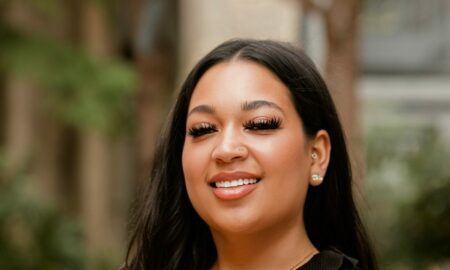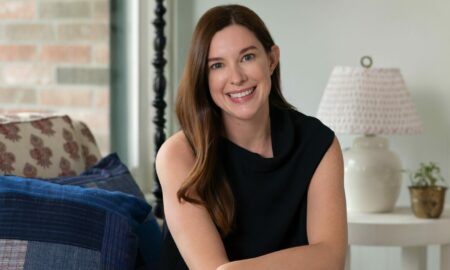Today we’d like to introduce you to Sasha Chada.
Can you briefly walk us through your story – how you started and how you got to where you are today?
Like a lot of helping professionals, my career started early at the volunteering level with experiences that put me in contact with other students. I had a lot of fun doing volunteer tutoring and test preparation when I was in high school; I enjoyed giving younger students the help I wish I received. When I came to my alma mater, the Johns Hopkins University, I knew I didn’t just want to study there. I wanted to be a part of an institution that was over a century old.
From day one, I was involved in residential life. I moved from being a Student Activities Group volunteer to a Tour Guide, to working as a Student Employee for fundraising and financial aid. At first, I wanted to move into academic counseling, but my proximity to the Office of Undergraduate Admissions really affected my perspective on admissions as a whole. I realized that there was so much I didn’t know when I was applying, and that the mad scramble my peers (and parents!) made for information on how to be more competitive could be made so much more efficient.
We throw students into an admissions process that’s more competitive than ever before, and then into a job market that’s radically different from the previous generation’s. The university-to-career pipeline has never been more fragmented; most selective universities don’t see themselves as career prep programs – but too often parents do. It can be intimidating to think that positioning oneself to develop marketable skills is a process that needs to start in high school, but the truth is that early birds have a leg up in professional development. Students interested in competitive programs like engineering, medicine, and business should start thinking about their admissions profile from the beginning of freshman year to make sure they aren’t edged out by competition.
As I learned about Johns Hopkins’ undergraduate admissions procedures from the perspective of the Office of Undergraduate Admissions, I realized I was working the wrong side of the desk. As much as I enjoyed helping the university find and care for the brightest young minds around, I couldn’t forget how I and my friends found the university application process to be daunting. I wanted to help the next generation of students understand the most effective ways to structure their education, avoiding the pitfalls I made and capitalizing on every opportunity they wanted. Even more, I wanted my students to feel confident that they understood the competitive admissions process and were in control of their candidacy.
I knew the system, and I knew how to connect with people and help them learn. I saw a way to meld my interests in counseling and admissions and became an admissions counselor. Ivy Scholars was born. I started counseling a small group of students from Houston and Sugar Land high schools, and word of mouth spread quickly. As some students moved back to their home countries, I started distance learning internationally. Demand increased, and I opened group classes and admissions workshops to help more students at once, eventually adding Elite Test Prep Instructors and Admissions Mentors to make sure students never lacked for our attention.
Would you change the way students write their college essays?
I’d help them revisit their attitudes towards essay writing. First, it’s important to note there are two kinds of essays for schools on the Common Application: the Personal Statement, which goes out to every university, and supplemental essays, which are school-specific. Despite the prevalence of essay sharing on social media, many applicants have trouble vocalizing what they want out of their essay.
The first question every student should ask themselves before writing is “what do I want this university to believe about me?” Keeping that question in mind will keep personal statements focused. I want students to keep in mind that their essays are their main communicative tool with the institutions to which they’re applying. Everything else – grades, test scores, extracurricular activities, research – those get reported.
Essays are the place students can illustrate who they are by sharing perspective along with facts. Writing to become an Ivy League student doesn’t just mean writing well; it means writing in a way that demonstrates your fit with Ivy League values. This requires a degree of reflective wit about one’s own development that high schools rarely encourage. I try to help students understand that the Personal Statement is nothing like the analytic papers they’re used to from AP or IB English. Nor is it purely a narrative of their experiences, or an exercise in self-reflection. The Personal Statement is challenging because it demands students combine these abilities.
The classical Personal Statement is one where the student tells a story about themselves, analyzes the situation and their response, and reflects on how that situation and response helped them mature intellectually. When done right, this format lends itself to a conclusion that makes an admission officer’s job easy, because the candidate’s intellectual qualities and character traits can be clearly compared to the priorities of the university. A conservative essay can fail to sufficiently elevate an application, but creativity and originality have their own risks. Many students come to Ivy Scholars concerned that they don’t know how to direct their creativity into a meaningful story.
Even after generating a narrative they feel represents their intellectual interests and character traits, students approach the editing process with trepidation. Are they really sending the message they want to? How do they gauge the acceptability of their disclosures, the line between brave honestly and oversharing? Our ability to help each student manage their representation of their unique circumstances is one of the reasons Ivy Scholars keeps getting recommended by parents, year after year. Of course, being able to say that we helped their child gain acceptance into a top-tier university never hurts.
We owe much of that success to the fact that our students get comfortable with the style Ivy Leagues expect. Their observations are clear and precise but shaded with enough wit to give a sense of their personality. The phrase “show, don’t tell” is endemic in essay writing circles; mastering it involves a comfort with which details to highlight and which to omit in order to compose the picture the student imagines. A student’s perspective can be demonstrated through the details they select in a more profound way than blunt claims of possessing certain personality traits or values.
The manner in which a student addresses their growth through their achievements is often more valuable than the achievements themselves. This kind of reflective writing is a real challenge to every student, especially ones who tend towards modesty despite their incredible achievements.
Does that advice hold true for all essays?
I think it’s a good model for Personal Statements and the easiest way to communicate what Ivy League schools are looking for. It’s by no means the only model for Personal Statements.
Supplemental essays, by design, have to be more diverse and creative. This is especially true of essays that share prompts that tend to produce a few common answers from the applicant body. Here, I’m thinking of UChicago’s quote interpretation essays or Johns Hopkins’ essay on collaboration. It behooves the most competitive applicants to think strategically about their responses because the topics that spring to mind are probably the first few topics that come to everybody’s mind. Originality means finding something sufficiently unconventional to be interesting and sufficiently significant to their identity to be worth sharing.
Others simply require a deeper understanding of the school’s priorities. Brown asks for students’ feelings about its curriculum, and admissions officers could play Bingo with the number of essays that praise ideas like “flexibility,” “free choice” and “determining my own education.” It’s hard to produce original responses to narrow prompts in applicant bodies of over 10,000 students. Students who manage that originality finds a way to relate unique parts of their paradigms and aspirations to the university’s mission, and build a relationship in the process.
Originality is even more important when universities ask a student why he or she wants to attend their institution. Far too many students – including me, once upon a time – write a basic shell for all these types of essays and swap out the name of the university, its programs, and maybe a few professors were interested in working with. This demonstrates an obvious lack of care and is one of the easiest ways for universities to weed out students. Every year, I explain to students that Penn undergraduate admissions knows Cornell undergraduate admissions very well, and can tell when students adapt their Penn supplemental essay from Cornell’s prompt about long-term plans (or vice-versa).
Penn wants to understand how students see themselves landing at Penn; Cornell wants to know what students aspire to after graduating. Both involve a discussion of how each university can help its applicants develop, but the similarities end there. Another piece of writing exists that students often forget about. It’s vitally important to use the Additional Information section of your application portal! Far too many students omit meaningful special circumstances from their application, convincing themselves that those circumstances aren’t special enough.
Many are scared of being seen as trying to give an excuse instead of an explanation. When properly used, this section can give much-needed context that helps admissions personnel make more informed decisions.
We’re always bombarded by how great it is to pursue your passion, etc – but we’ve spoken with enough people to know that it’s not always easy. Overall, would you say things have been easy for you?
What parts of your education helped you prepare to lead your company?
Well, my own struggles began during my college application process. My parents pushed me to do the best job I could, and I knew a good application was important to my future. I investigated the process thoroughly, combing through CollegeConfidential.com and a few books on the subject, but never felt that I had complete control over the process. I missed a few deadlines. In fact, I struggled with planning the whole thing – like too many students, I left important essays to December, rushing to complete them after midterms and hoping things would work out. In retrospect, not having a plan was incredibly stressful. Since then, I’ve learned the underappreciated skill of using a calendar to break massive projects into bite-sized pieces. That’s a skill I pass onto Ivy Scholars students, so they can have an easier time than I did.
Even aside from planning, I felt anxious that I couldn’t find the right answers to very important questions. It felt like my parents were expecting me to figure out if universities were the right fit for me after a day-long visit or even a perusal of their website. I had no idea how to assess the culture of an institution, and nobody familiar with that culture to help me understand what I was getting into. I know now that I made a major mistake in copying the same supplemental essay to the University of Pennsylvania and Princeton. I thought because they had similar word counts and prompts, the same essay would fit both. At the time, I saw the Ivy Leagues as one undifferentiated mass of prestige and hope, not as schools with a history and a direction for the future. I had no idea how to talk to them and start building my relationship.
I also struggled to find a career path in college. I considered academia and medicine before realizing that I was picking out the most difficult and prestigious careers rather than finding ways to employ my aptitudes and interests to help others. There were days that I thought about my future and felt resigned rather than hopeful. I wasn’t the only one – once I started discussing those feelings with my friends, I was shocked to learn how many of my peers at Hopkins had the same doubts. We’d worked so hard to give us access to the best opportunities, but approached them with trepidation. We weren’t sure our hard work would lead us to anything meaningful.
Helping people has always been meaningful to me; I’m a natural mentor. When I came back to Houston, I wanted the next generation of college students to genuinely enjoy the admissions process.
What challenges did you face in your first year?
My first year at Ivy Scholars, I lost a lot of sleep wondering how each step of the process could be optimized better. My students were hard workers, but they had plenty of volunteering, AP/IB coursework, extracurricular groups, research, and internships to attend to – all the while trying to enjoy their high school years! Each piece of the process I can streamline gives them more time to live their lives instead of worrying about getting into college.
So over the next two years, I wrote a program to organize overlapping admission essay topics for the top 25 universities to make sure our writing process was as efficient as possible. Using it, we reduced average writing time by 40%! That’s more time for students to enjoy their summer as a rising 12th grader, and more flexibility when seniors come in close to the December 31 deadline for urgent help.
I’ve also come to appreciate the weight of the responsibility entrusted to me by parents. They’re relying on me to help their son or daughter reach universities that can do so much to change their lives. Beyond expertise, I think the way anyone earns this trust is having the right attitude. When I was in high school, I read 7 Habits of Highly Effective People, and Habit 5 (“Seek First to Understand”) struck me as the most important. Trying to understand students’ perspectives, rather than giving them your perspective and hoping they come to see things as you do, is how you show you really care about their intellectual development.
An educator’s biggest job isn’t to disseminate information – that’s what videos, textbooks, and articles are for. The best teachers work hard to form a mentoring relationship that augments a student’s ability to learn. They help students become conscious of problem-solving style and strategy, coaching specific techniques while creating awareness of how those fit together into the discipline as a whole. In other words… they help students improve as scholars.
Almost all Ivy Scholars students enter with some doubt – they’re wary of teachers that tell them what to do and how to do it but pay no attention to the “click” moment. Ivy Scholars takes ownership of creating comprehension and mastery, cutting out all the busywork, all the repetition – everything but those moments. That’s why our students succeed.
How would you like to change the way students apply to college?
If I could change one thing about the admissions process, it would be helping students understand that every meaningful difference they make in the world can work to their credit on their applications. Admissions staff are well-trained to understand the difference between people who seek out prestige and people who seek to accomplish something meaningful; when students come to Ivy Scholars, we make sure that they earn more than empty titles or generic awards. We want admissions staff to see that our students set ambitious goals that distinguish them from other applicants, and then achieve with elan.
What else do you want students to know about applying to college?
“Seek first to understand” runs both ways. Students who develop a deeper understanding of the culture of the universities they apply to can communicate with those universities more meaningfully. One of the first lessons as we begin the admissions consulting process is that joining a university isn’t just a matter of intellectual aptitude. Top tier universities, especially the Ivy League schools, are defined by a shared approach to scholarship. The phrase “Liberal Arts Education” gets a bad rap from parents and educators concerned that liberal arts degrees no longer have the value they used to, or from students worried they’ll be excluded for their passion about science, technology, engineering, or mathematical (STEM) subject matter. Both of these couldn’t be farther from the truth. The Liberal Arts Education that Ivy Leagues provide doesn’t refer to a group of majors – it’s present in business, STEM, architecture, and so on.
It’s an approach that emphasizes Socratic learning, in which reasoned, creative discussion with peers and professors serves as each student’s primary intellectual proving ground. At other universities, this would risk collapsing the classes’ evaluation methods and delaying their curriculums. It’s a testament to the quality of students and professors at these top-tier universities that instead, the ability to analyze and challenge each other’s ideas leads students to learn in more meaningful ways than any other educational institution can provide. More to the point, the immediacy and cognitive flexibility demanded by these discussions help students build the theoretical groundwork not only to lead existing fields but to innovate into entirely new ones.
Many Ivy League applicants will pick majors outside the liberal arts, but none should discount the value of integrating that approach into their educations. Ivy League universities weren’t founded to prepare students for great careers, though they do so exceptionally well. They were founded to give social and intellectual leaders of the next generation the opportunity to push each other to excel. Students who make admissions officers believe that they’re ready to join this community get accepted. Those who don’t are rejected.
Tell us about Ivy Scholars. What do you do, what do you specialize in, what are you known for?
Ivy Scholars builds students into candidate material for top-tier universities. We also cover tutoring and test prep and use that time to build a relationship with the student so that when their applications come due, the rock-solid rapport needed for a good team is already there.
Of course, admissions strategy is our biggest job. Many teens feel intimidated by a long-term project with plenty of ambiguities and no clear benchmarks of progress. Ivy Scholars helps students see every step of their admissions process clearly, which can go a long way towards reducing anxiety. By their tenth hour with Ivy Scholars, every student has their entire admissions process broken down into week-by-week priorities, with monthly benchmarks to gauge progress. This keeps students and parents comfortable – they don’t have to wonder if they’ve built enough admissibility because our metrics can confirm they’re on-target for their goals.
We see plenty of parents who are intelligent and dedicated to giving their children the best education they can. They find that the breadth and depth of our admissions knowledge is one of the best tools they can employ to build their children’s futures. We take profile-building activities – extracurriculars, summer programs, volunteering, internships, advanced coursework – to the next level and make sure no opportunity or deadline is ever forgotten.
Our students have taken graduate-level classes at Rice, interned with medical, legal, and management professionals at the top of their fields, treated cancer patients, engineered lifesaving medical devices, and even coordinated emergency rescue activities for natural disaster relief. I emphasize accomplishment there because Ivy Scholars recognizes – sometimes to a greater extent than local high school counselors – that awards, honors, and titles are increasingly devaluated in competitive admissions. Far too many students fight to be a participant in a selective program, the president of a club, on the board of a nonprofit – and then have few meaningful responsibilities once given the opportunity.
Many applicants don’t realize that having their talents recognized and then failing to capitalize on their opportunities is even worse than going unrecognized. In their drive to look like good candidates, too many top students give universities the impression that they’re trying harder to look like good candidates than to learn and grow.
So how do Ivy Scholars students demonstrate their accomplishments?
By holding themselves to the same standards that professionals are held to. Students whose family connections help them find internships (which is most of them) are especially vulnerable to being misperceived. High school internships, once a mark of prestige, are increasingly viewed with suspicion by competitive admissions departments due to the difficulty of understanding a student’s actual contribution. Ivy Scholars solution to this is to make the admissions departments’ jobs as easy as possible by structuring internships with concrete responsibilities that are measured by quantifiable impacts.
All-Ivy Scholars students leave internships with demonstrable evidence of their contribution to their organization. We pin down a part of the organization’s mission that strikes a delicate balance: important enough to consider meaningful, but not so important that a well-supervised high school student couldn’t be involved. Experience with corporate life helps students develop a sense of accountability as well. Many of our students are used to being the top few students at their local high school, so challenging them to contribute on a corporate level helps them get comfortable being the metaphorical big fish leaving the small pond.
Our students take the same attitude towards their community service. Rather than acting as another pair of hands or participating in engineered pay-to-volunteer programs, Ivy Scholars volunteering is profile-based. Students reflect on the social issues their life experiences have best equipped them to understand and address them with the unique skills they’ve built. One of our students synergized his interest in medicine with his trilinguality to serve as an impromptu translator when a hospital in his home country struggled to serve an influx of injured tourists.
Another helped abused girls to reintegrate into new communities and establish long-term educational programs that drastically reduced truancy. These tasks required a combination of the daring to try, the discipline to continue, the resilience to self-correct after failure, and the creativity to find workarounds. Many of our students have formed clubs or nonprofit organizations dedicated to their mission, and have found that their leadership inspires their peers to contribute as well. Some earn Congressional or Presidential medals for their work.
A critical part of making sure all these opportunities are recognized is developing the writing skills to express what they meant to the student.
What are you most proud of as a company? What sets you apart from others?
Our students don’t just go to Ivy League and top-tier universities. They also get the program they want within those universities. I’m always regretful to see smart students – often at the top of their class – put together an application strong enough to admit them to a great university, but not quite strong enough to get them the major they wanted. Too often, those students get stuck in humanities classes for a year or two and face uncertainty about getting back into the field they care about.
It’s also great to help applicants understand the depth of majors and courses of study at different universities. From Brown’s BS/MD program to Penn’s dual degree programs to Dartmouth’s D-Plan to the incredibly competitive Biomedical Engineering major at Johns Hopkins, there’s a level of opportunity at these top schools that can give the top 0.01% of each year’s applicant body a ticket to enter the highest levels of politics, finance, research, medicine, and business. They aren’t well advertised and often have fewer than 10 spots per year, but Ivy Scholars students have gained admission and prospered for it.
Anything else you want to tell us?
One final point worth mentioning: the most important thing Ivy Scholars does is try to understand a student’s perspective, not only to explain our admissions roadmap to them but to help them see how we came to form that plan in the first place. It’s unfortunate that the natural initiative of students often gets quashed by the emphasis many high schools places on rote, structured activity.
This inflexibility can discourage students from creating their own plans. The students who belong to the universities which provide the best opportunities are the kind of students that never stop looking for creative ways to reimagine the status quo.
Helping students understand how to generate their own structure, whether it’s for a test prep timeline and curriculum, a 6-month service project, or a keynote speech at a conference, gives me confidence that they’ll have the skills to succeed when transitioning into the Ivy League.
Has luck played a meaningful role in your life and business?
Luck in admissions is that feeling an admissions officer experiences upon reading your essay, smiling, and thinking “what a great fit.”
Putting yourself in a position to be that lucky is not a matter of chance.
Contact Info:
- Address: #375, 77 Sugar Creek Center Blvd Sugar Land, TX 77479
- Website: IvyScholars.net
- Phone: 713.714.6949
- Email: Enrollment@IvyScholars.net, Sasha@IvyScholars.net
- Facebook: https://www.facebook.com/ivyscholarshouston
- Yelp: https://www.yelp.com/biz/ivy-scholars-houston

We Tutor


Tutoring






Image Credit:
Johns Hopkins University
Getting in touch: VoyageHouston is built on recommendations from the community; it’s how we uncover hidden gems, so if you know someone who deserves recognition please let us know here.

















